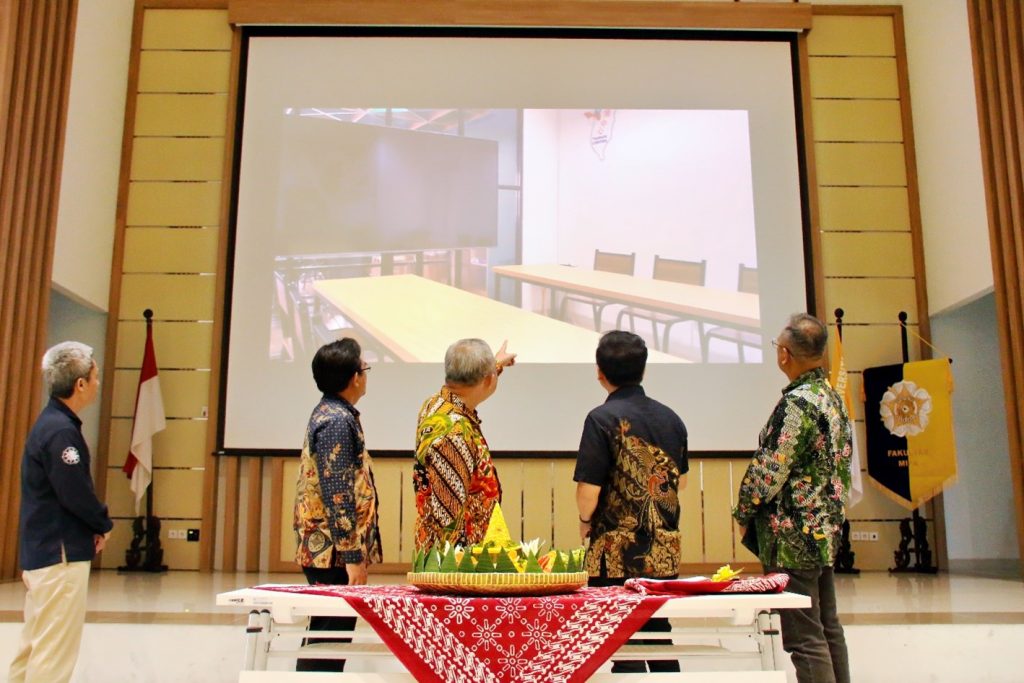
FMIPA UGM Collaborates with ANC Japan: Launching Japan Career Center
SDG 4: Quality Education |

SDG 4: Quality Education |
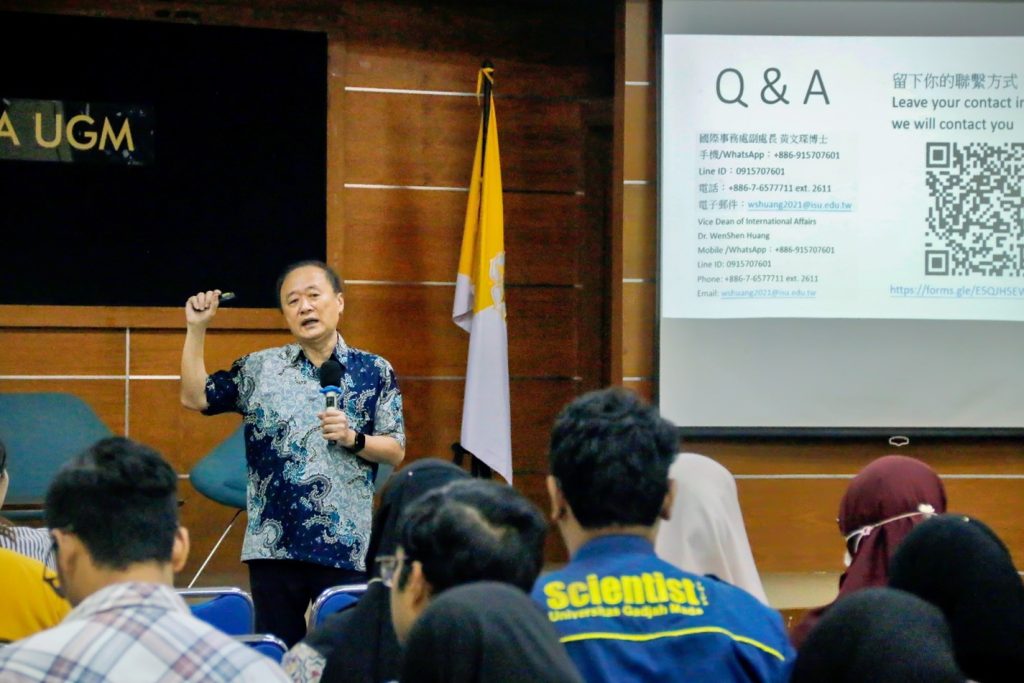
Prof. Huang explained the scholarship program (Photo: Hero)
FMIPA UGM and I-Shou Taiwan University held a scholarship program socialization for an undergraduate to doctoral students on Friday, Mar 15th, 2024 at the Auditorium of FMIPA UGM. The participants included undergraduate students, faculty members, and FMIPA alumni interested in continuing their studies. The Dean of FMIPA UGM and other officials also attended the event, welcoming Prof. Huang Wenshen, Ph.D., Vice Dean of the International Office and Cross-Strait Affairs from I-Shou Taiwan University, who would present scholarship information.
Dr. rer. nat. Wiwit Suryanto, S.Si., M.Si., Vice Dean for Research and Community Service, gave a welcome speech and officially opened the event.
“We hope that this activity will be beneficial, and we (FMIPA UGM) encourage attendees to consider participating in the programs offered,” said Dr. Wiwit.
The undergraduate student delivered a question related to the scholarship program (Photo: Hero)
The enthusiasm of the socialization participants was evident from the variety of questions asked, such as campus environment conditions, tips for saving expenses, and part-time work opportunities while studying.
“Can we work part-time while attending classes there?” asked one participant.
Fransiska, representing I-Shou Taiwan University and also an assistant to Prof. Huang, explained that the stipend provided by the scholarship is already sufficient to cover daily expenses. If students wish to take on part-time work, it is recommended to manage their time wisely to avoid exhaustion.
“The stipend provided is quite sufficient. The cost of living there is affordable compared to Indonesia,” explained Fransiska.
Fransiska explained the scholarship program (Photo: Hero)
Prof. Huang explained the scholarship application process, which will open in early April 2024. The scholarship coverage includes stipends and tuition fees. The scholarship program offered is a double degree program at the undergraduate level, with 2 years of study at FMIPA, 2 years at I-Shou Taiwan University, and 2 years of work experience in the Taiwanese industry. For other programs at the master’s and doctoral levels, the scholarship covers tuition fees and stipends.
“During their studies, students will receive training such as Mandarin language proficiency and other competencies. After graduation, students will be directed to work in the industry to gain experience and produce outstanding science graduates ready to enter the workforce,” said Prof. Huang.
This scholarship socialization activity is an implementation of SDG number 4, Quality Education, by encouraging students to pursue globally and sustainably recognized education. Additionally, the established partnership supports SDG number 17, Partnerships for the Goals, by preparing outstanding science graduates ready to enter the industry.
Keywords: Scholarship, I-Shou Taiwan University, industry
Author: Febriska Noor Fitriana
Photos: Hero Prakosa Wibowo Priyanto
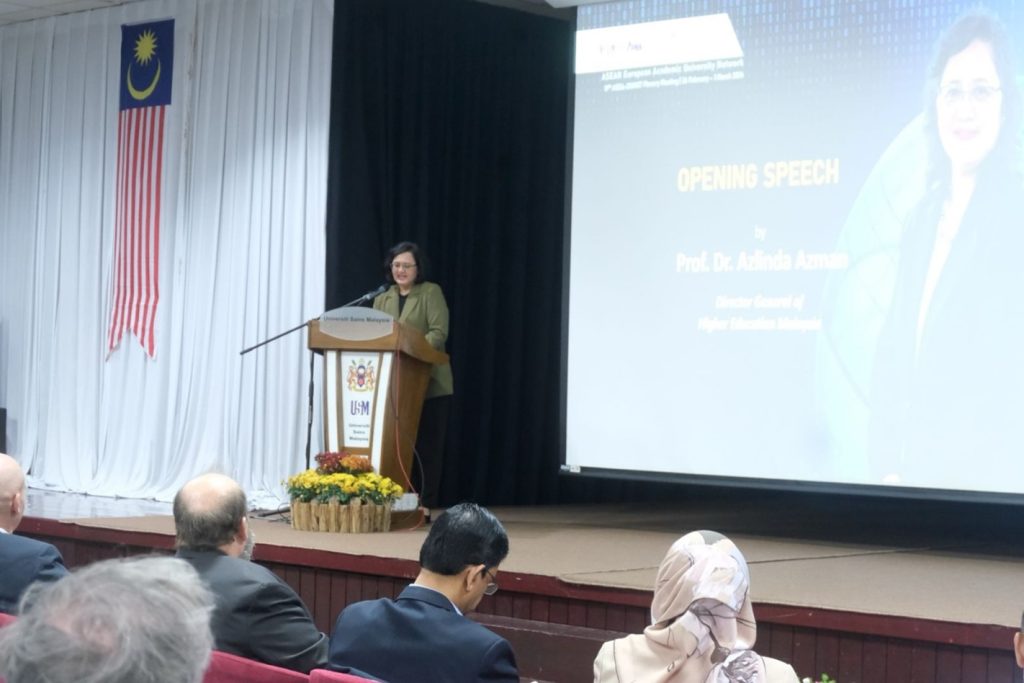
The opening of the ASEA-Uninet Plenary meeting by Prof. Dr. Azlinda Azman, Director-General of Higher Education Malaysia (Photo: Harno)
The Asea-Uninet 19th Plenary Meeting, an assembly of the ASEAN-European Academic University Network, brought together academic strength through the promotion of scientific, cultural, and humanitarian relations, as well as personal contacts, scientific findings, and collaboration from February 26 to March 1, 2024, in Penang, Malaysia. Universiti Sains Malaysia (USM) in Penang hosted the event, attended by members from universities in Europe, including Austria, Italy, Germany, Indonesia, Malaysia, Pakistan, the Philippines, Thailand, and Vietnam. ASEA-UNINET research projects span various disciplines, ranging from Sciences, Technology, Economics, Social Sciences, and Humanities to Medicine and Pharmacy. All research projects are based on voluntary participation from researchers, emphasizing the strengthening of individual and scientific capacities.
A visit to the Centre for Chemical Sciences and discussions with Dr. Rizal and Dr. Melati took place during this event (Photo: Harno)
Prof. Dr. Harno Dwi Pranowo, M.S., representing Universitas Gadjah Mada, engaged in meetings and discussions with partners from Europe and ASEAN to plan cooperation for the next 18 months. Several discussions with partners have focused on strengthening joint research in the field of humanities related to museums and art conservation, science, and technology related to artificial intelligence, the design of drug compounds using computational chemistry approaches, and the implementation of student and researcher exchanges between member countries.
Participants in the ASEA-UNINET Plenary meeting (Photo: Harno)
Topics discussed during this event include Alumni Engagement in ASEA-UNINET AND DIGITAL HUMANISM as a driver to address the urgent need for a holistic socio-technical approach to recent developments in computer science and artificial intelligence. Other topics include Funding Opportunities from ASEA-UNINET for Research, Strategies for Expanding the number of European Universities in ASEA-UNINET, and the diversification and Impact of European and National Funding Schemes for academic cooperation between Southeast Asia and Europe. ASEA-UNINET regularly awards the Bernd Rode Award to researchers who have contributed to scholarly development, and this is a result of collaboration with ASEA-UNINET. The categories are young researchers and senior researchers.
During this occasion, Prof. Harno also conducted visits and discussions with partners at the School of Chemical Sciences at USM to discuss closer collaboration regarding collaborative research, student and research exchanges, external examiners, the MBKM program, and joint seminars. This activity is related to the SDGs goal number 4, Quality Education, through the proportion of scholarships provided to students from developing countries, including the least developed countries, to study in other developing countries. ASEA-UNINET provides various scholarship programs to support the mobility of students and researchers between member countries. At the ASEA-UNINET 19th Plenary Meeting, funding opportunities for research and academic cooperation were discussed, including scholarship schemes for students and researchers.
Enhancing multi-stakeholder partnerships supporting the achievement of SDGs goal number 17, partnerships to achieve goals. ASEA-UNINET is a network connecting universities in Southeast Asia and Europe, promoting cooperation and collaboration in various academic fields. The ASEA-UNINET 19th Plenary Meeting was attended by various stakeholders, including universities, governments, and international organizations, demonstrating a commitment to strengthen cooperation in achieving SDGs goals.
Participants from Indonesia with the Indonesian Ambassador to Malaysia (Photo: Harno)
Keywords: ASEA-UNINET, exchange, partnership, scholarship
Author: Prof. Dr. Harno Dwi Pranowo
Photos: Prof. Dr. Harno Dwi Pranowo
Editor: Febriska Noor Fitriana
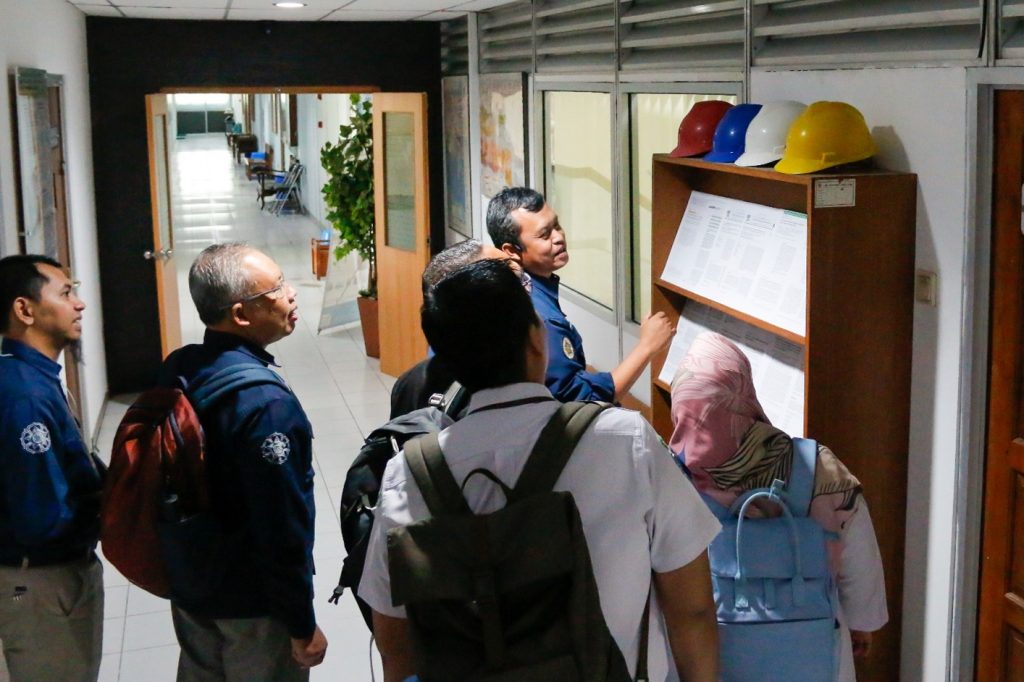
Dr. Wiwit presented research publications to BMKG (Photo: Hero)
FMIPA UGM received a visit from the Meteorology, Climatology, and Geophysics Agency (BMKG) on Wednesday, Feb 28th, 2024 at Merapi Room, Department of Geophysics, FMIPA UGM. This visit aims to strengthen collaboration to boost the number of human resources in the fields of science and technology through Physics postgraduate programs.
Prof. Dr. Eng. Kuwat Triyana, M.Si., the Dean of FMIPA UGM, welcomed the presence and reinforcement of the collaboration. “The key to the success of an institution lies in the quality of its human resources. Even though the equipment and technology are complete, inadequate human resources can be risky,” said Prof. Kuwat.
Engagement dialogue between FMIPA UGM and BMKG (Photo: Hero)
In this regard, Dr.rer.nat. Wiwit Suryanto, S.Si., M.Si., a lecturer in Geophysics at FMIPA UGM, presented the types of study programs that BMKG employees can participate in, such as regular and research tracks. Furthermore, an introduction to learning facilities and support programs such as laboratories, field activities, and soft skills training was provided.
“Our graduates will not only be competent technically and scientifically but also in non-technical areas such as communication and work management. We also encourage students to commit to producing publications such as journals,” said Dr. Wiwit.
Nina Amelia Sasmita, M.Si., the Head of the Domestic Education Team at BMKG, expressed the purpose of the visit.
“We have many competent employees who are ready to pursue further education. Therefore, we need a learning program system that can accommodate our employees by dividing their time between studying and working. Additionally, we provide scholarships for our employees to complete their studies,” said Nina.
A photo session as a closing meeting (Photo: Hero)
From the agenda of the visit, FMIPA UGM also supports SDGs points 4 and 7 regarding quality education and innovation by encouraging the number of researchers in the fields of science and technology in postgraduate programs. Furthermore, FMIPA UGM welcomes government agencies in partnerships to achieve the goal of increasing the number of researchers by SDGs point 17.
Keywords: scholarship, BMKG, physics, science, research, innovation
Author: Febriska Noor Fitriana
Photos: Hero Prakosa Wibowo Priyanto
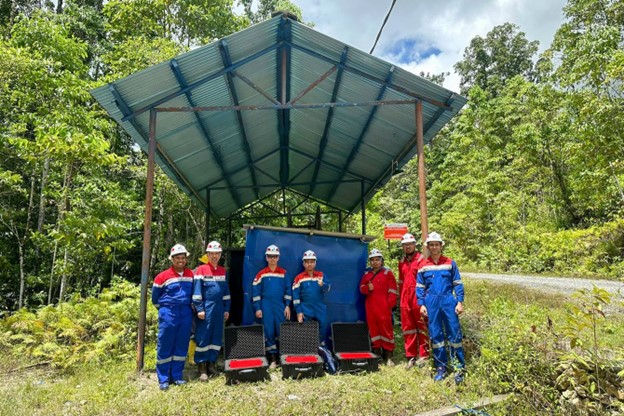
Geophysics UGM and Upstream Innovation PHE conducted initial field testing in 2023 (Photo: UGM Geophysics Research Team).
The collaboration between Geophysics FMIPA UGM and Upstream Innovation PHE in its third year through Electrically Enhanced Oil Recovery innovation is poised to enter the field. This effort is aimed at supporting the government’s program to increase oil production targets by 1 million barrels by 2030 in Indonesia. The UGM Geophysics Research Team, along with Upstream Innovation PHE, actively contributes to achieving this goal.
“Through this research collaboration, our (FMIPA UGM) hope is to support the government’s target of 1 million barrels of oil production,” said Prof. Kuwat Triyana, Dean of FMIPA UGM, during the “Kickoff Meeting for the Electrically Enhanced Oil Recovery Collaboration Study in 2024” held via online meeting on Monday, Jan 12th, 2024.
In 2023, initial field testing was conducted to assess the performance of the Electrically Enhanced Oil Recovery equipment. By continually improving the quality of this equipment, the UGM Geophysics Research Team and Upstream Innovation PHE are confident that they are ready to enter the field for broader oil production in 2024.
“We appreciate the trust placed in us over the past few years. We continue to strive in the development of this Electrically Enhanced Oil Recovery equipment to support the 1 million barrel production target in Indonesia,” said Dr. Afif Rakhman, head of the UGM Geophysics Research Team.
Electrically Enhanced Oil Recovery is one of the supportive methods in oil exploitation by injecting high-powered direct current (DC) into reservoirs to enhance production. By installing anodes and cathodes at specific distances and configurations, the electric current can alter the physical properties of the rocks it passes through, facilitating the movement of oil beneath the earth’s surface. The equipment developed by this team also features remote control capabilities through the internet network.
“This developed technology is easily implementable due to its relatively simple installation process and online operation, making it more effective and efficient in terms of time and cost,” said Metrik Pradana, initiator of the Electrically Enhanced Oil Recovery research from Upstream Innovation PHE.
The technological innovation built through collaboration between institutions and industry partners is an effort to support government programs, particularly in contributing to the achievement of Sustainable Development Goals (SDGs). This research collaboration reflects point 9 – Infrastructure, Industry, and Innovation, through innovation in meeting the country’s energy needs, as well as point 17 – Partnerships to Achieve Goals, through collaborative efforts to meet the goal of national oil requirements production.
Keywords: Geophysics, Pertamina, PHE, oil, Electrically Enhanced Oil Recovery
Author: Pamungkas Yuliantoro
Photo: UGM Geophysics Research Team.
Editor: Febriska Noor Fitriana
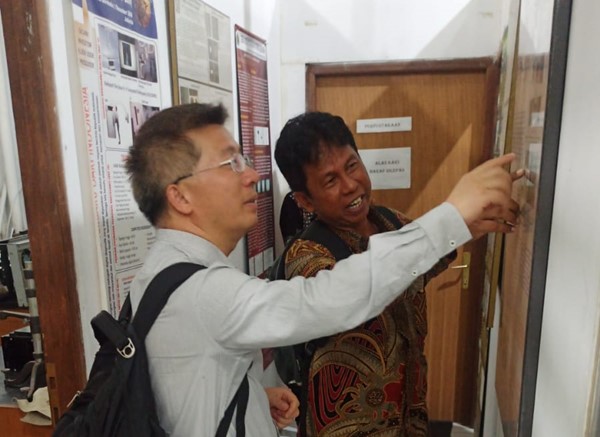
Professor Gede Bayu Suparta presented research at the Image Physics Laboratory to Professor Xiao Yongshun
The Department of Physics at FMIPA UGM welcomed a visit from Prof. Xiao Yongshun from the Department of Engineering Physics, National Tsinghua University on Feb 12th, 2024. This visit is part of his series of visits to several institutions in Indonesia such as the National Research and Innovation Agency (BRIN) and UGM. During this visit, Prof. Xiao Yongshun was greeted directly by Prof. Gede Bayu Suparta, Prof. Edi Suharyadi (Chair of the Department), and Prof. Kuwat Triyana (Dean of FMIPA UGM). The agenda included discussions on the potential for research and academic collaboration between the two institutions.
The Department of Physics at FMIPA UGM has a unique focus on research addressing local issues, which is part of the Tri Dharma of higher education. Its research focuses on volcanology and the application of radiation technologies such as digital radiography and CT scans. During the visit, Prof. Xiao Yongshun showed great interest in these unique aspects, which became the main points of discussion. The potential use of muons in volcanology research also drew attention, considering the high activity of Mount Merapi which requires constant monitoring. It is hoped that the utilization of muons in monitoring Mount Merapi’s activity can contribute significantly to understanding the characteristics of its activity and disaster risk mitigation.
The research conducted at the Department of Physics UGM has a close correlation with research in the field of radiography applications at Tsinghua University. Prof. Xiao Yongshun, who specializes in X-ray and neutron imaging research, presented on radiography research at Tsinghua University. He is also a member of the Chinese Society of NDT (Non-Destructive Testing). Tsinghua University has had the NUCTECH company since 1997, which operates in the fields of radiation technology applications, image processing, artificial intelligence, and radiation protection.
A group photo was taken after the presentation of research on radiography applications at Tsinghua University
Tsinghua University views UGM as one of the top universities in Indonesia with unique research capabilities. By involving BRIN in research collaboration, the Department of Physics UGM plans to further develop collaboration with Tsinghua University in the field of muon imaging, as well as in CT-Scan and radiography using X-ray radiation generated with LINAC (Linear Accelerator) technology. This collaboration is expected to positively contribute to advancing science and technology, education, student exchange, and expert cooperation between the two countries.
Radiography research by the Department of Physics UGM to address local issues such as health and natural disasters represents SDGs number 3, which is good health and well-being, number 11, which is sustainable cities and communities, and number 17, which is partnerships. This is evident from medical interventions through CT scans as part of essential healthcare services, disaster management, and established cooperation agreements. Thus, the agenda of the visit and the cooperation undertaken have an impact in line with the needs of the SDGs points.
Keywords: Physics, radiography, healthcare, disaster management, Tsinghua
Author: Chalis Setiyadi
Photos: Kristedjo (BRIN)
Editor: Febriska Noor Fitriana
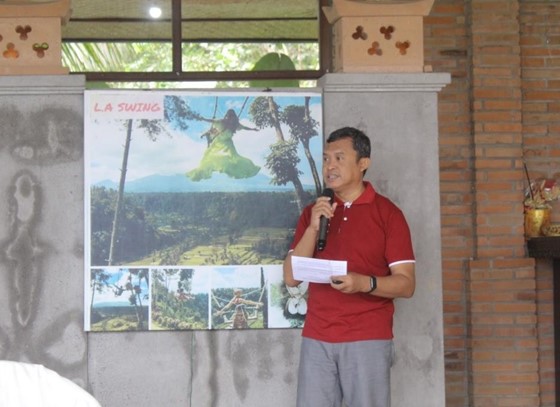
Dr. Wiwit Suryanto, representing the Astungkara Giri Agung Aman Project as a Geophysics lecturer at UGM, succinctly presented the project’s activities up to 2024
The Geophysics FMIPA UGM collaborated with the Faculty of Tourism and the Faculty of Engineering of Udayana University (UNUD), along with the Mount Fuji Research Institute (MFRI) to organize a workshop and focus group discussion (FGD) as the annual flagship activity of the AGAA Project. The AGAA Project aims to enhance disaster preparedness on the slopes of volcanoes in Indonesia. The workshop and FGD activities occurred at the Lereng Agung Restaurant, Besakih Village, Menanga District, Karangasem Regency, Bali on Saturday Feb 3rd 2024.
“This activity is expected to provide a platform for mutual learning from the experiences of speakers in disaster mitigation strategies, particularly volcanic eruptions,” said Dr. Wiwit Suryanto, the head of the AGAA project and a lecturer in Geophysics at the Faculty of Mathematics and Natural Sciences, UGM. The speakers included representatives from the Regional Disaster Management Agency (BPBD) of East Java (Mount Kelud and Semeru), North Sumatra (Mount Sinabung), West Sumatra (Mount Marapi), the Coordinator of the Disaster Risk Reduction Forum in Yogyakarta Special Region, and the Fujiyoshida City BPBD in Japan. Each speaker shared experiences from their respective regions in handling volcanic eruption crises and the contingency plans held by each area. This workshop and FGD are part of the AGAA Project funded by the Japan International Cooperation Agency (JICA) through a grassroots project scheme. The AGAA Project aims to build disaster-resilient communities by empowering local universities. This workshop and FGD represent the culmination of Year 2 activities in the AGAA project. Attendees this Saturday included the Karangasem Regency BPBD, local disaster mitigation enthusiasts grouped in the Karangasem Regency Disaster Risk Reduction Forum, and the headmasters of public elementary schools in Karangasem Regency. By participating in this event, the local community of Karangasem can directly learn from other volcano slope communities in Indonesia. Furthermore, the lessons learned from this one-day workshop and FGD can serve as a guideline for the Disaster Risk Reduction Forum (PRB) in the Karangasem Regency in preparing for future eruptions of Mount Agung.
Dr. Ade Anggraini, a geophysics expert and lecturer at UGM, led a focus group discussion on the Development of Local Platforms in building community preparedness on the slopes of Indonesian volcanoes
The demonstration of volcanic disaster mitigation teaching aids, created by MFRI Japan and the geophysics laboratory at UGM, was conducted by elementary school principals on the slopes of Mount Agung alongside MFRI staff
During this occasion, a simple experiment was demonstrated on the mechanism of volcanic eruption using basic teaching aids. The experiment was facilitated by staff from MFRI Japan and demonstrated by the school headmasters who had previously undergone training sessions from the AGAA Project in 2023 and 2024. The same teaching aids were also distributed to the Karangasem PRB Forum. They will be used as educational tools for the community to understand the mechanisms of volcanic eruptions in a simple yet scientifically accurate manner. Thus, it is hoped that the disaster mitigation learning of the Karangasem community regarding volcanic eruptions will continue and endure after the conclusion of the AGAA Project in 2025 in line with the implementation of the Sustainable Development Goals (SDGs). This activity aligns with SDG point 11 under pillar 5 on Sustainable Cities and Communities, particularly in reducing the adverse impacts of natural disasters. Point 11, pillar 5, relates to reducing the risk index, disaster prevention, preparedness, and post-disaster mitigation.
Keywords: geophysics, disaster mitigation, volcano
Author: Fayza Indhira
Photos: AGAA Project
Editor: Dr.rer.nat. Ade Anggarini, S.Si., M.Si.
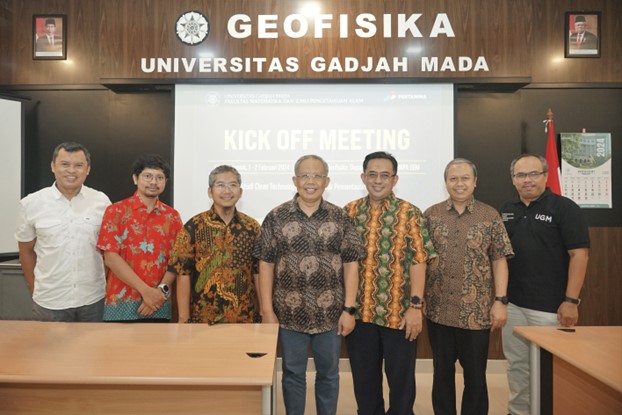
Kick-Off Meeting by Pertamina Hulu Energy, the Dean’s Office of FMIPA UGM, and the SP-ERT Research Study innovation team. From left to right: Dr. Wiwit Suryanto, Dr. T. Marwan Irnaka, Fatkhul Mu’in, Prof. Kuwat Triyana, Dr. Fajar Adi Kusumo, and Dr. Eddy Hartantyo (photo: Shofi R.)
With the spirit of strengthening scientific publication, the SP-ERT (Self Potential – Electrical Resistivity Tomography) research study at UGM Geophysics Laboratory collaborates with PT Pertamina Hulu Energi Upstream Innovation (PHE-UI) continued into 2024, marked by the Kick-Off Meeting on Feb 1st – 2nd Feb 2024, in the Merapi Room, Department of Physics, FMIPA UGM. This study is a development of laboratory and field-scale research that has been ongoing since 2022.
“This is the first kick-off activity in 2024,” said Dr. Wiwit Suryanto, Vice Dean for Research and Cooperation, in his opening remarks. “For us, it is a blessing because Upstream Innovation is still willing to collaborate with us to continue this research.”
The previously conducted SP-ERT study was deemed capable of detecting water injection activities at one of Pertamina’s fields. Its advantage lies in its ability to transmit data wirelessly, allowing users to access field data from anywhere using internet-connected devices.
In addition to the study’s advantages, Fatkhul Mu’in, Specialist Innovation Geophysics Upstream Innovation, is optimistic about the production of not only instruments and software but also scientific papers. “Among the many collaborations we have forged, FMIPA UGM feels beneficial. Unfortunately, it is not visible, only we (Upstream Innovation) know. Whereas in the geoscience community, it is not visible. This year, I ask to take the stage,” said Mr. Mu’in at the kick-off event.
Dean of FMIPA UGM, Prof. Kuwat Triyana, is aware of the lack of publications from studies at FMIPA UGM, particularly in geophysics. “Geophysics is a data repository. Hence, it is regrettable if, as a ‘warehouse’ of data, there is no time to write (for publication),” emphasized Prof. Kuwat, who also opened this activity.
The kick-off at the beginning of this year is expected to ignite a new spirit in scientific publication related to studies in UGM Geophysics, thus supporting Sustainable Development Goals. Point 4 about Quality Education is supported by contributions to the scientific community through scientific publications. Moreover, innovation and collaboration with industry are in line with point 9 by involving researchers, engineers, and lecturers.
Keywords: Geophysics, industry collaboration, Pertamina, water injection
Author: Shofi Rahmadini
Photo: Shofi Rahmadini
Editor: Febriska Noor Fitriana

FMIPA UGM Collaborates with ANC Japan: Launching Japan Career Center
SDG 4: Quality Education | SDG 9: Industry, Innovation And Infrastructure | SDG 17: Partnership For The Goals
Watching the room tour of the Japan Career Center located at FMIPA UGM

Prof. Huang explained the scholarship program (Photo: Hero)
FMIPA UGM and I-Shou Taiwan University held a scholarship program socialization for an undergraduate to doctoral students on Friday, Mar 15th, 2024 at the Auditorium of FMIPA UGM. The participants included undergraduate students, faculty members, and FMIPA alumni interested in continuing their studies. The Dean of FMIPA UGM and other officials also attended the event, welcoming Prof. Huang Wenshen, Ph.D., Vice Dean of the International Office and Cross-Strait Affairs from I-Shou Taiwan University, who would present scholarship information.
Dr. rer. nat. Wiwit Suryanto, S.Si., M.Si., Vice Dean for Research and Community Service, gave a welcome speech and officially opened the event.
“We hope that this activity will be beneficial, and we (FMIPA UGM) encourage attendees to consider participating in the programs offered,” said Dr. Wiwit.
The undergraduate student delivered a question related to the scholarship program (Photo: Hero)
The enthusiasm of the socialization participants was evident from the variety of questions asked, such as campus environment conditions, tips for saving expenses, and part-time work opportunities while studying.
“Can we work part-time while attending classes there?” asked one participant.
Fransiska, representing I-Shou Taiwan University and also an assistant to Prof. Huang, explained that the stipend provided by the scholarship is already sufficient to cover daily expenses. If students wish to take on part-time work, it is recommended to manage their time wisely to avoid exhaustion.
“The stipend provided is quite sufficient. The cost of living there is affordable compared to Indonesia,” explained Fransiska.
Fransiska explained the scholarship program (Photo: Hero)
Prof. Huang explained the scholarship application process, which will open in early April 2024. The scholarship coverage includes stipends and tuition fees. The scholarship program offered is a double degree program at the undergraduate level, with 2 years of study at FMIPA, 2 years at I-Shou Taiwan University, and 2 years of work experience in the Taiwanese industry. For other programs at the master’s and doctoral levels, the scholarship covers tuition fees and stipends.
“During their studies, students will receive training such as Mandarin language proficiency and other competencies. After graduation, students will be directed to work in the industry to gain experience and produce outstanding science graduates ready to enter the workforce,” said Prof. Huang.
This scholarship socialization activity is an implementation of SDG number 4, Quality Education, by encouraging students to pursue globally and sustainably recognized education. Additionally, the established partnership supports SDG number 17, Partnerships for the Goals, by preparing outstanding science graduates ready to enter the industry.
Keywords: Scholarship, I-Shou Taiwan University, industry
Author: Febriska Noor Fitriana
Photos: Hero Prakosa Wibowo Priyanto

Towards a Sustainable Future: ASEA-UNINET Unites Academic Forces to Address Global Challenges
The opening of the ASEA-Uninet Plenary meeting by Prof. Dr. Azlinda Azman, Director-General of Higher Education Malaysia (Photo: Harno)
The Asea-Uninet 19th Plenary Meeting, an assembly of the ASEAN-European Academic University Network, brought together academic strength through the promotion of scientific, cultural, and humanitarian relations, as well as personal contacts, scientific findings, and collaboration from February 26 to March 1, 2024, in Penang, Malaysia. Universiti Sains Malaysia (USM) in Penang hosted the event, attended by members from universities in Europe, including Austria, Italy, Germany, Indonesia, Malaysia, Pakistan, the Philippines, Thailand, and Vietnam. ASEA-UNINET research projects span various disciplines, ranging from Sciences, Technology, Economics, Social Sciences, and Humanities to Medicine and Pharmacy. All research projects are based on voluntary participation from researchers, emphasizing the strengthening of individual and scientific capacities.
A visit to the Centre for Chemical Sciences and discussions with Dr. Rizal and Dr. Melati took place during this event (Photo: Harno)
Prof. Dr. Harno Dwi Pranowo, M.S., representing Universitas Gadjah Mada, engaged in meetings and discussions with partners from Europe and ASEAN to plan cooperation for the next 18 months. Several discussions with partners have focused on strengthening joint research in the field of humanities related to museums and art conservation, science, and technology related to artificial intelligence, the design of drug compounds using computational chemistry approaches, and the implementation of student and researcher exchanges between member countries.
Participants in the ASEA-UNINET Plenary meeting (Photo: Harno)
Topics discussed during this event include Alumni Engagement in ASEA-UNINET AND DIGITAL HUMANISM as a driver to address the urgent need for a holistic socio-technical approach to recent developments in computer science and artificial intelligence. Other topics include Funding Opportunities from ASEA-UNINET for Research, Strategies for Expanding the number of European Universities in ASEA-UNINET, and the diversification and Impact of European and National Funding Schemes for academic cooperation between Southeast Asia and Europe. ASEA-UNINET regularly awards the Bernd Rode Award to researchers who have contributed to scholarly development, and this is a result of collaboration with ASEA-UNINET. The categories are young researchers and senior researchers.
During this occasion, Prof. Harno also conducted visits and discussions with partners at the School of Chemical Sciences at USM to discuss closer collaboration regarding collaborative research, student and research exchanges, external examiners, the MBKM program, and joint seminars. This activity is related to the SDGs goal number 4, Quality Education, through the proportion of scholarships provided to students from developing countries, including the least developed countries, to study in other developing countries. ASEA-UNINET provides various scholarship programs to support the mobility of students and researchers between member countries. At the ASEA-UNINET 19th Plenary Meeting, funding opportunities for research and academic cooperation were discussed, including scholarship schemes for students and researchers.
Enhancing multi-stakeholder partnerships supporting the achievement of SDGs goal number 17, partnerships to achieve goals. ASEA-UNINET is a network connecting universities in Southeast Asia and Europe, promoting cooperation and collaboration in various academic fields. The ASEA-UNINET 19th Plenary Meeting was attended by various stakeholders, including universities, governments, and international organizations, demonstrating a commitment to strengthen cooperation in achieving SDGs goals.
Participants from Indonesia with the Indonesian Ambassador to Malaysia (Photo: Harno)
Keywords: ASEA-UNINET, exchange, partnership, scholarship
Author: Prof. Dr. Harno Dwi Pranowo
Photos: Prof. Dr. Harno Dwi Pranowo
Editor: Febriska Noor Fitriana

Dr. Wiwit presented research publications to BMKG (Photo: Hero)
FMIPA UGM received a visit from the Meteorology, Climatology, and Geophysics Agency (BMKG) on Wednesday, Feb 28th, 2024 at Merapi Room, Department of Geophysics, FMIPA UGM. This visit aims to strengthen collaboration to boost the number of human resources in the fields of science and technology through Physics postgraduate programs.
Prof. Dr. Eng. Kuwat Triyana, M.Si., the Dean of FMIPA UGM, welcomed the presence and reinforcement of the collaboration. “The key to the success of an institution lies in the quality of its human resources. Even though the equipment and technology are complete, inadequate human resources can be risky,” said Prof. Kuwat.
Engagement dialogue between FMIPA UGM and BMKG (Photo: Hero)
In this regard, Dr.rer.nat. Wiwit Suryanto, S.Si., M.Si., a lecturer in Geophysics at FMIPA UGM, presented the types of study programs that BMKG employees can participate in, such as regular and research tracks. Furthermore, an introduction to learning facilities and support programs such as laboratories, field activities, and soft skills training was provided.
“Our graduates will not only be competent technically and scientifically but also in non-technical areas such as communication and work management. We also encourage students to commit to producing publications such as journals,” said Dr. Wiwit.
Nina Amelia Sasmita, M.Si., the Head of the Domestic Education Team at BMKG, expressed the purpose of the visit.
“We have many competent employees who are ready to pursue further education. Therefore, we need a learning program system that can accommodate our employees by dividing their time between studying and working. Additionally, we provide scholarships for our employees to complete their studies,” said Nina.
A photo session as a closing meeting (Photo: Hero)
From the agenda of the visit, FMIPA UGM also supports SDGs points 4 and 7 regarding quality education and innovation by encouraging the number of researchers in the fields of science and technology in postgraduate programs. Furthermore, FMIPA UGM welcomes government agencies in partnerships to achieve the goal of increasing the number of researchers by SDGs point 17.
Keywords: scholarship, BMKG, physics, science, research, innovation
Author: Febriska Noor Fitriana
Photos: Hero Prakosa Wibowo Priyanto

Geophysics UGM and Upstream Innovation PHE conducted initial field testing in 2023 (Photo: UGM Geophysics Research Team).
The collaboration between Geophysics FMIPA UGM and Upstream Innovation PHE in its third year through Electrically Enhanced Oil Recovery innovation is poised to enter the field. This effort is aimed at supporting the government’s program to increase oil production targets by 1 million barrels by 2030 in Indonesia. The UGM Geophysics Research Team, along with Upstream Innovation PHE, actively contributes to achieving this goal.
“Through this research collaboration, our (FMIPA UGM) hope is to support the government’s target of 1 million barrels of oil production,” said Prof. Kuwat Triyana, Dean of FMIPA UGM, during the “Kickoff Meeting for the Electrically Enhanced Oil Recovery Collaboration Study in 2024” held via online meeting on Monday, Jan 12th, 2024.
In 2023, initial field testing was conducted to assess the performance of the Electrically Enhanced Oil Recovery equipment. By continually improving the quality of this equipment, the UGM Geophysics Research Team and Upstream Innovation PHE are confident that they are ready to enter the field for broader oil production in 2024.
“We appreciate the trust placed in us over the past few years. We continue to strive in the development of this Electrically Enhanced Oil Recovery equipment to support the 1 million barrel production target in Indonesia,” said Dr. Afif Rakhman, head of the UGM Geophysics Research Team.
Electrically Enhanced Oil Recovery is one of the supportive methods in oil exploitation by injecting high-powered direct current (DC) into reservoirs to enhance production. By installing anodes and cathodes at specific distances and configurations, the electric current can alter the physical properties of the rocks it passes through, facilitating the movement of oil beneath the earth’s surface. The equipment developed by this team also features remote control capabilities through the internet network.
“This developed technology is easily implementable due to its relatively simple installation process and online operation, making it more effective and efficient in terms of time and cost,” said Metrik Pradana, initiator of the Electrically Enhanced Oil Recovery research from Upstream Innovation PHE.
The technological innovation built through collaboration between institutions and industry partners is an effort to support government programs, particularly in contributing to the achievement of Sustainable Development Goals (SDGs). This research collaboration reflects point 9 – Infrastructure, Industry, and Innovation, through innovation in meeting the country’s energy needs, as well as point 17 – Partnerships to Achieve Goals, through collaborative efforts to meet the goal of national oil requirements production.
Keywords: Geophysics, Pertamina, PHE, oil, Electrically Enhanced Oil Recovery
Author: Pamungkas Yuliantoro
Photo: UGM Geophysics Research Team.
Editor: Febriska Noor Fitriana

Professor Gede Bayu Suparta presented research at the Image Physics Laboratory to Professor Xiao Yongshun
The Department of Physics at FMIPA UGM welcomed a visit from Prof. Xiao Yongshun from the Department of Engineering Physics, National Tsinghua University on Feb 12th, 2024. This visit is part of his series of visits to several institutions in Indonesia such as the National Research and Innovation Agency (BRIN) and UGM. During this visit, Prof. Xiao Yongshun was greeted directly by Prof. Gede Bayu Suparta, Prof. Edi Suharyadi (Chair of the Department), and Prof. Kuwat Triyana (Dean of FMIPA UGM). The agenda included discussions on the potential for research and academic collaboration between the two institutions.
The Department of Physics at FMIPA UGM has a unique focus on research addressing local issues, which is part of the Tri Dharma of higher education. Its research focuses on volcanology and the application of radiation technologies such as digital radiography and CT scans. During the visit, Prof. Xiao Yongshun showed great interest in these unique aspects, which became the main points of discussion. The potential use of muons in volcanology research also drew attention, considering the high activity of Mount Merapi which requires constant monitoring. It is hoped that the utilization of muons in monitoring Mount Merapi’s activity can contribute significantly to understanding the characteristics of its activity and disaster risk mitigation.
The research conducted at the Department of Physics UGM has a close correlation with research in the field of radiography applications at Tsinghua University. Prof. Xiao Yongshun, who specializes in X-ray and neutron imaging research, presented on radiography research at Tsinghua University. He is also a member of the Chinese Society of NDT (Non-Destructive Testing). Tsinghua University has had the NUCTECH company since 1997, which operates in the fields of radiation technology applications, image processing, artificial intelligence, and radiation protection.
A group photo was taken after the presentation of research on radiography applications at Tsinghua University
Tsinghua University views UGM as one of the top universities in Indonesia with unique research capabilities. By involving BRIN in research collaboration, the Department of Physics UGM plans to further develop collaboration with Tsinghua University in the field of muon imaging, as well as in CT-Scan and radiography using X-ray radiation generated with LINAC (Linear Accelerator) technology. This collaboration is expected to positively contribute to advancing science and technology, education, student exchange, and expert cooperation between the two countries.
Radiography research by the Department of Physics UGM to address local issues such as health and natural disasters represents SDGs number 3, which is good health and well-being, number 11, which is sustainable cities and communities, and number 17, which is partnerships. This is evident from medical interventions through CT scans as part of essential healthcare services, disaster management, and established cooperation agreements. Thus, the agenda of the visit and the cooperation undertaken have an impact in line with the needs of the SDGs points.
Keywords: Physics, radiography, healthcare, disaster management, Tsinghua
Author: Chalis Setiyadi
Photos: Kristedjo (BRIN)
Editor: Febriska Noor Fitriana

Dr. Wiwit Suryanto, representing the Astungkara Giri Agung Aman Project as a Geophysics lecturer at UGM, succinctly presented the project’s activities up to 2024
The Geophysics FMIPA UGM collaborated with the Faculty of Tourism and the Faculty of Engineering of Udayana University (UNUD), along with the Mount Fuji Research Institute (MFRI) to organize a workshop and focus group discussion (FGD) as the annual flagship activity of the AGAA Project. The AGAA Project aims to enhance disaster preparedness on the slopes of volcanoes in Indonesia. The workshop and FGD activities occurred at the Lereng Agung Restaurant, Besakih Village, Menanga District, Karangasem Regency, Bali on Saturday Feb 3rd 2024.
“This activity is expected to provide a platform for mutual learning from the experiences of speakers in disaster mitigation strategies, particularly volcanic eruptions,” said Dr. Wiwit Suryanto, the head of the AGAA project and a lecturer in Geophysics at the Faculty of Mathematics and Natural Sciences, UGM. The speakers included representatives from the Regional Disaster Management Agency (BPBD) of East Java (Mount Kelud and Semeru), North Sumatra (Mount Sinabung), West Sumatra (Mount Marapi), the Coordinator of the Disaster Risk Reduction Forum in Yogyakarta Special Region, and the Fujiyoshida City BPBD in Japan. Each speaker shared experiences from their respective regions in handling volcanic eruption crises and the contingency plans held by each area. This workshop and FGD are part of the AGAA Project funded by the Japan International Cooperation Agency (JICA) through a grassroots project scheme. The AGAA Project aims to build disaster-resilient communities by empowering local universities. This workshop and FGD represent the culmination of Year 2 activities in the AGAA project. Attendees this Saturday included the Karangasem Regency BPBD, local disaster mitigation enthusiasts grouped in the Karangasem Regency Disaster Risk Reduction Forum, and the headmasters of public elementary schools in Karangasem Regency. By participating in this event, the local community of Karangasem can directly learn from other volcano slope communities in Indonesia. Furthermore, the lessons learned from this one-day workshop and FGD can serve as a guideline for the Disaster Risk Reduction Forum (PRB) in the Karangasem Regency in preparing for future eruptions of Mount Agung.
Dr. Ade Anggraini, a geophysics expert and lecturer at UGM, led a focus group discussion on the Development of Local Platforms in building community preparedness on the slopes of Indonesian volcanoes
The demonstration of volcanic disaster mitigation teaching aids, created by MFRI Japan and the geophysics laboratory at UGM, was conducted by elementary school principals on the slopes of Mount Agung alongside MFRI staff
During this occasion, a simple experiment was demonstrated on the mechanism of volcanic eruption using basic teaching aids. The experiment was facilitated by staff from MFRI Japan and demonstrated by the school headmasters who had previously undergone training sessions from the AGAA Project in 2023 and 2024. The same teaching aids were also distributed to the Karangasem PRB Forum. They will be used as educational tools for the community to understand the mechanisms of volcanic eruptions in a simple yet scientifically accurate manner. Thus, it is hoped that the disaster mitigation learning of the Karangasem community regarding volcanic eruptions will continue and endure after the conclusion of the AGAA Project in 2025 in line with the implementation of the Sustainable Development Goals (SDGs). This activity aligns with SDG point 11 under pillar 5 on Sustainable Cities and Communities, particularly in reducing the adverse impacts of natural disasters. Point 11, pillar 5, relates to reducing the risk index, disaster prevention, preparedness, and post-disaster mitigation.
Keywords: geophysics, disaster mitigation, volcano
Author: Fayza Indhira
Photos: AGAA Project
Editor: Dr.rer.nat. Ade Anggarini, S.Si., M.Si.

Kick-Off Meeting by Pertamina Hulu Energy, the Dean’s Office of FMIPA UGM, and the SP-ERT Research Study innovation team. From left to right: Dr. Wiwit Suryanto, Dr. T. Marwan Irnaka, Fatkhul Mu’in, Prof. Kuwat Triyana, Dr. Fajar Adi Kusumo, and Dr. Eddy Hartantyo (photo: Shofi R.)
With the spirit of strengthening scientific publication, the SP-ERT (Self Potential – Electrical Resistivity Tomography) research study at UGM Geophysics Laboratory collaborates with PT Pertamina Hulu Energi Upstream Innovation (PHE-UI) continued into 2024, marked by the Kick-Off Meeting on Feb 1st – 2nd Feb 2024, in the Merapi Room, Department of Physics, FMIPA UGM. This study is a development of laboratory and field-scale research that has been ongoing since 2022.
“This is the first kick-off activity in 2024,” said Dr. Wiwit Suryanto, Vice Dean for Research and Cooperation, in his opening remarks. “For us, it is a blessing because Upstream Innovation is still willing to collaborate with us to continue this research.”
The previously conducted SP-ERT study was deemed capable of detecting water injection activities at one of Pertamina’s fields. Its advantage lies in its ability to transmit data wirelessly, allowing users to access field data from anywhere using internet-connected devices.
In addition to the study’s advantages, Fatkhul Mu’in, Specialist Innovation Geophysics Upstream Innovation, is optimistic about the production of not only instruments and software but also scientific papers. “Among the many collaborations we have forged, FMIPA UGM feels beneficial. Unfortunately, it is not visible, only we (Upstream Innovation) know. Whereas in the geoscience community, it is not visible. This year, I ask to take the stage,” said Mr. Mu’in at the kick-off event.
Dean of FMIPA UGM, Prof. Kuwat Triyana, is aware of the lack of publications from studies at FMIPA UGM, particularly in geophysics. “Geophysics is a data repository. Hence, it is regrettable if, as a ‘warehouse’ of data, there is no time to write (for publication),” emphasized Prof. Kuwat, who also opened this activity.
The kick-off at the beginning of this year is expected to ignite a new spirit in scientific publication related to studies in UGM Geophysics, thus supporting Sustainable Development Goals. Point 4 about Quality Education is supported by contributions to the scientific community through scientific publications. Moreover, innovation and collaboration with industry are in line with point 9 by involving researchers, engineers, and lecturers.
Keywords: Geophysics, industry collaboration, Pertamina, water injection
Author: Shofi Rahmadini
Photo: Shofi Rahmadini
Editor: Febriska Noor Fitriana

